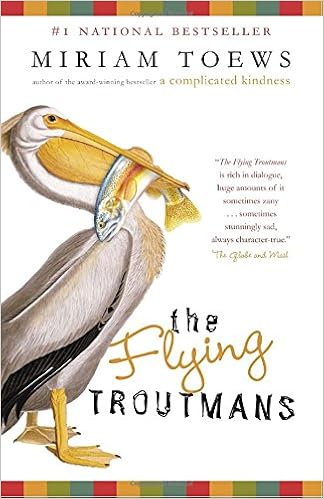 I’ve enjoyed several
of Toews’ novels, especially All My Puny
Sorrows and Women Talking. Somehow I missed The Flying Troutmans which was published ten years ago and won the
Rogers Writers’ Trust Fiction Prize, so I thought I’d check it out.
I’ve enjoyed several
of Toews’ novels, especially All My Puny
Sorrows and Women Talking. Somehow I missed The Flying Troutmans which was published ten years ago and won the
Rogers Writers’ Trust Fiction Prize, so I thought I’d check it out.
Hattie Troutman
returns to Manitoba to look after her 15-year-old nephew Logan and 11-year-old
niece Thebes when their mother, Hattie’s older sister Min, has a psychotic
break and is hospitalized. Fearing that
the children will be placed in foster care, Hattie impulsively sets off with
the children on a road trip into the U.S. to find their father Cherkis whom Min
chased away several years ago. As is
typical in road trip novels, they meet their share of quirky characters. Hattie also learns about her two charges and
herself, and because of her reminiscences, the reader learns about the
relationship between Hattie and Min.
It is Logan and Thebes
who steal the show. Logan is a silent
and moody teenager who shoots hoops to relieve stress and carves his thoughts
into the dashboard of the van. Thebes is
a non-stop talker with purple hair and fake tattoos. She never bathes and wears the same clothes
every day. Her obsession is making giant
novelty cheques for people. They are
insightful and precocious, having had to grow up quickly because they’ve been
the ones to look after their mother during her struggles with mental
illness. Though they are certainly odd,
they are also vulnerable. Though the
siblings annoy each other, there is true affection between them, and there is
no doubt that they love their mother.
Hattie is 28 but seems
very immature. She has less insight into
herself than the children have into themselves.
Thebes knows that she’s “on thin ice in the social hierarchy department
. . . not exactly a popular girl” (37), and Logan acknowledges that he feels
very angry at Min’s illness and his father’s abandonment. Hattie, meanwhile, can’t figure out how she
feels about her ex-boyfriend. She
behaves impulsively, the road trip being the best example, and seems to have no
idea about how to care for her nephew and niece. She never encourages Thebes to take a bath,
and Thebes has to tell her to talk to Logan and how to approach him: “You should have a talk with him, said
Thebes. I don’t know what to say, I
said. Well, she said, you could just
start out with talking about how you felt when you were fifteen” (123). Hattie even lets Logan drive, though he doesn’t
have a license.
Hattie’s way of coping
has been to run away. Because she couldn’t
deal with Min’s illness, she “moved to Paris, fled Min’s dark planet for the
City of Lights” (8). The road trip is
just another way to escape: “Anyway I
didn’t want to be here. I didn’t know
how to talk to the kids. I loved them,
but I didn’t want to live with my sister” (27).
Logan has more sense of responsibility than she does; he feels an
obligation to look after his mother and sister.
At one point he asks, “But who would just do that . . . Like, just
leave. You know? Like, just disappear” (127). Hattie’s decision at the end does suggest a
change.
A central question in
the novel is how to help someone who only wants to be helped to die. Several characters suggest that love is the
answer: “we were always meant to be
moving in a love direction, always” (205).
Logan suggests an answer when he discusses how he shoots hoops, always
believing the ball will go into the basket, even after several have not: “I’m always sure the next one will go in”
(242).
No comments:
Post a Comment